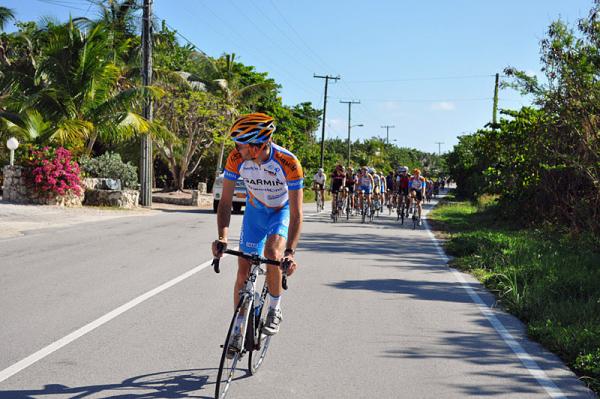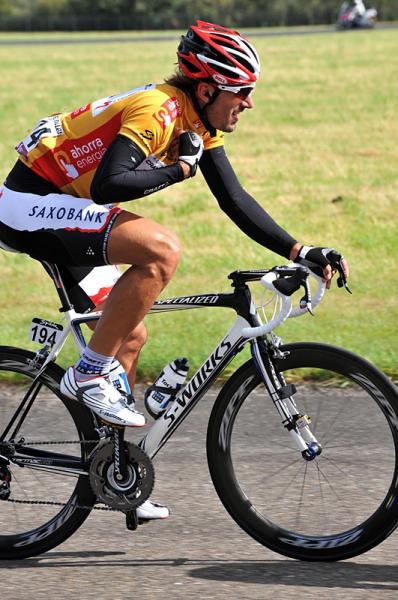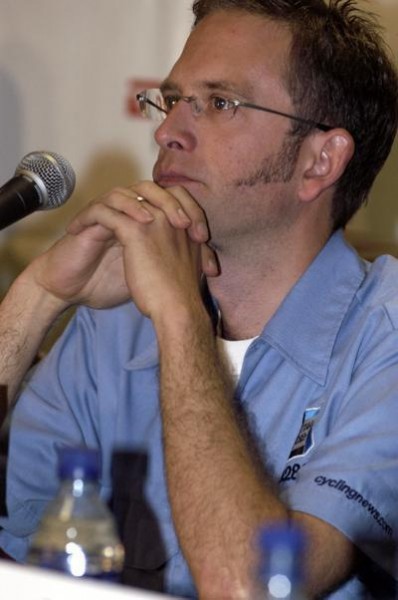Radio Silence…
Garmin-Cervelo boss backs calls to keep race radios



With a new year come new changes and new rules in cycling. One of the changes that has been garnering the most public interest is the recent, albeit slow burning, radio communication ban that the UCI has introduced in races ranked .1 and .HC. It’s bound to become one of the most contentious issues as the year unfolds.
I felt that before we start the cycling season, and people become entrenched in their positions regarding radios, I’d give my brief history with this issue—how I‘ve seen it from both sides and been on both sides of the earpiece.
Early in 2009, I was elected president of the AIGCP (the association of Pro Tour and Pro Continental teams). I was the youngest and least experienced of the team managers ever elected to such a post. It was an odd set of circumstances that got me that role, but I figured I should treat the post with respect and vigour. So, I pushed hard for a series of tri-lateral meetings to occur between the teams, the UCI and the top race organizers. After two or three meetings we slowly melted a bit of the ice that had formed between the various groups since the 2008 fights between the UCI and ASO. By the time we met in early June 2009, we were ready to start making some real progress on the issues.
Christian Prudhomme, Angelo Zomegnan, Javier Guillen, Alain Rumpf, a few others and I met in a chic airport restaurant, the kind you’d only find in Geneva airport. My personal push had to do with the rights of participation in the top events, and I’d been making this the central topic of every meeting. This particular meeting was not much different. After lunch when the topic of “testing” a few stages of the Tour de France without radios came up, I didn’t think much of it and said “yes, sure, that’d be fine…”
Frankly, I didn’t really see the big deal and was far more focused on other issues that pertained to the financial health of cycling and anti-doping. I overlooked the radio issue as relatively unimportant and honestly didn’t see the harm in a little test.
That was a big mistake. As the start of the 2009 Tour de France approached, it was clear that the majority of teams felt the “test” of radios was a far more important issue than I had represented to the race organizers and the UCI. We all know the story of what happened with regards to the radio free test in the 2009 Tour; the teams acted in a unified manner and were able to preserve the interests of the majority.
Still, even though I had supported my colleagues in 2009, I remained unconvinced that the use of radio communication was a serious issue and felt that some of the opposing arguments from those who wished to ban radios had merit. Maybe racing would be more exciting without radios? Maybe more intelligent riders would win more often? However, despite these justifications the majority of the AIGCP teams did not want them banned, so I needed to start representing that stance.
In the fall of 2009, I was attending the CUPT (the advisory board of directors for the ProTour) meeting, along with Roberto Amadio of Liquigas, in Mendrisio during the World Championships. We met for roughly eight hours on the Tuesday before the race. During the course of the meeting we covered a broad range of topics, including the 2010 calendar, the new races in Montreal, the bio-passport and many others, but the use or banning of radios was never discussed. To my surprise, the next morning I read in L’Equipe that the introduction of a ban on radio communication had been approved by the UCI management committee.
I also read a very unflattering quote by Patrick Lefevere regarding me. It basically said that I’d sold the teams down the river, not represented their interests in the UCI management committee meeting, and was nothing more than a doormat for Pat McQuaid. Obviously I was upset, but what neither Lefevere nor L’Equipe knew was that I wasn’t part of the UCI management committee meeting, nor was any representative of any of the teams part of this discussion or ruling. I read about it in the newspaper, the same as Lefevere had. And even though I was in the same building at the same time as this decision had been made, I had no idea that it had occurred.
While I still was undecided on my personal opinion about the pros and cons of not being able to use radios, the fact that this decision had been made with little to no input from the people it affected most really upset me. Despite the fact that I didn’t feel strongly about keeping radios in use, I did feel very strongly that a democratic system of equitable representation should be used when introducing regulations that affect the businesses of teams, the safety of riders and the outcome of competition. In other words: teams should have a voice in how the sport is governed – a very strong voice, as we, collectively, make up the largest economic part of cycling.
The radio ban did indeed come into play in 2.2 and National level events in 2010. While this wasn’t affecting Team Garmin-Transitions or any of the other ProTour teams, it was already coming into play for our U23 team. I’d had some conversations with other team managers who also had feeder teams and inquired how this was affecting racing. Eusebio Unzue had attended a number of U23 events and his take was not positive about the radio ban. He raised the issue that the chaos behind the race, in the caravan, whenever a flat or crash occurred was notable. Since directors had little information as to who needed help there was a constant and dangerous jockeying for position with 3,000lbs cars right behind the peloton. I did not witness this first hand until I went and watched our U23 team race a few times.
It quickly became apparent to me that the arguments of those in favor of a radio ban were unfounded. The impact of having no radios was not changing the tactics of the race at all, but it was reducing many “luck-founded” factors such as crashes, feeding, and flat tires to the lowest common denominator. Races were being won and lost not by team work, strength and cohesion, but by luck, lack of information and the bad fortune of others
An example. Our GC rider for the Tour of Utah was a young rider named Lachlan Morton. Lachlan was poised to move into the top five on GC. However, he crashed due to a front wheel blow-out on the descent of a first category climb halfway through the race. He had no capacity to tell his teammates he was in trouble. We in the car had no way of informing his teammates either. In fact, we almost missed Lachlan on the side of the road because he’d gone off in a ditch and was obscured. No information was available to anyone. The valiant and beautiful effort of an entire team bringing their leader back to the front of the race was moot because of lack of information.
It became apparent to me, very quickly, that the lack of radio communication was simply randomizing the outcomes of races, dumbing down cycling and reducing the value of teamwork, sacrifice and the bond between teammates.
This doesn’t even touch upon all the examples of the dangers we faced with feeding riders at poor times, driving into the middle of the peloton to give them instructions and constantly boxing with the other team cars. My observations were congruent with Eusebio’s. It seemed very amateur and, more importantly, very dangerous – not something pro cycling needs.
We also had the privilege of having a very well known financial advisor in the car that day, someone who oversees almost $80 billion of other people’s money. His comment after this whole incident was: “Good communication in sports is just like in a free market. It increases the likelihood of a fair and correct outcome. Good communication increases the likelihood of the best team with the best rider winning.”
With that, my mind had been totally changed on the radio issue. I no longer see it as an obligatory stance to represent in my role with the AIGCP, it is now also what I believe.
Cycling is a team sport, and just like any other team sport, from soccer to American football, the athletes need to have the best information and best communication possible, so that the best decisions can be made. The argument that the smartest rider or team wins when radios are banned is bunk; the smartest rider is the one who knows how to use all the information available to make better decisions than his opponent. The smartest team? The same.
All the top team sports in the world have increased the amount of information available to coaches and athletes, via new technologies and simple time outs, over the last 30 years. Cycling shares more in common with these team sports than with individual sports such as running or swimming, which have little need for such communication. There are, after all, no time outs in cycling. So how does the team work as one?
After looking at this issue from every possible angle, my opinion is quite simple: if we want to encourage the best competition and glean the best, most worthy winner, then we need to give the athletes the best information possible, with the best form of communication possible and ultimately see who uses it… the best.
In short, we need to keep the radios in use.
The latest race content, interviews, features, reviews and expert buying guides, direct to your inbox!